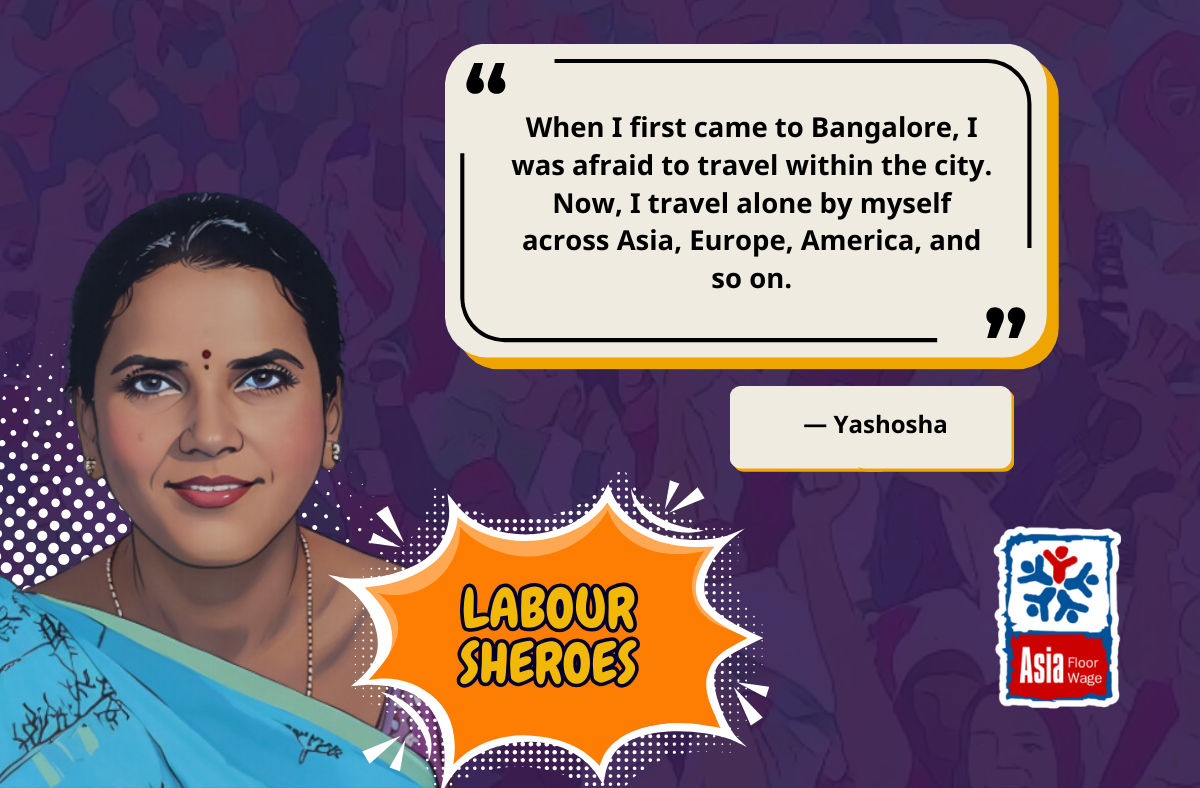Yashodha’s Dream: Establishing a Garment Workers’ Union and Women’s Cooperative Society

By Yashodha PH
| Content Warning: This story includes descriptions of domestic violence, sexual abuse, and workplace harassment, which some readers may find distressing. |
I was born and raised in a small village in Tumkur District, Karnataka, India. I spent my childhood with my grandparents, who were important to me and whom I respected. I attended primary school up to Class 4 in the village. For middle school, I had to walk 4 km each way to get to school, and I completed my education up to Class 7.
There was no scarcity of food. We used to play in the well, wander through mango plantations, drink tender coconut, and connect with the village’s flowers, plants, and trees. Watching the sprouting of plants with amazement, I used to kiss the flowers. I enjoyed seeing the colourful butterflies and trailing behind them.
During school holidays, on the weekends, I would look for birds’ nests and find joy in watching the delicate chicks come to life. Our family used to prepare coconut oil, which I loved applying to my hair, washing it with shikakai (senegalia rugata, a spiny climbing shrub) and water boiled over firewood in a large brass pot. These were the most enjoyable and memorable days of my life.
To continue my education, I moved to my parents’ house. As one of four siblings—three girls and a boy—we faced numerous difficulties and could not have two square meals daily. My father worked in the agricultural fields, while my mother was busy with housework and caring for us.
We were already struggling to make ends meet when a three-year drought hit the district. My father tried to work in a hotel but could not secure steady employment. We relied on rice porridge and cheap rice from the fair-price shop to have at least one meal daily. We went many nights without food, and somehow, I managed to complete my secondary school education.
At 17, I was immediately married off. By 21, I had two children—a daughter and a son— and my husband worked in the agricultural fields. Food and other essentials were not scarce, but I had to work hard in the agricultural fields, grazing cows, cooking and doing other household chores. On top of all my hard labour, I had to bear my mother-in-law’s torture, my father-in-law’s sexual abuse, and my husband’s jealous suspicions. If I came home from the field a little late, my husband would ask me, “Who did you go see?” and beat me. This was routine.
One day, the food I cooked ended up not tasting good, so my husband and mother-in-law dragged me out of the house and beat me terribly. My father’s sister, brother, and their family lived across from our home. They came to stop the violence against me, but my husband told them it was a “family matter” and they should keep away. They moved back and stood silently, watching.
My parents heard about this incident and came to see me when I was home alone. My father, with much grief, told me that because I have two sisters and a brother at their house, I should not go there. I was told to stay in my husband’s house and try to tolerate the abuse. He did not even ask me why I was beaten. After that, I started to fight my battle alone. I used to question some of the abusive behaviour and would get beaten more for it.
Fate played another cruel game with me. My husband developed severe stomach pain. The family thought it could be appendicitis, but without our knowledge, the appendix had ruptured, bleeding internally, and led to his swift death. Just 20 days (about 3 weeks) before his death, I lost my son. These two incidents made my life hell. I had a lot of mental pressure.
My brother had recently married, and I had no place at the house. To build my life, I learned tailoring and came to Bangalore looking for employment. I worked in small factories for a few years and later spent 8 years working in export garment factories. In the factories, there were high production targets along with verbal, physical, and sexual abuse. Despite these conditions, I liked spending my leisure time talking to women garment workers, understanding and learning from their life experiences. I also try to listen to the problems faced by my colleagues and support them with empathy.
Another difficult period in my life came when I faced sexual abuse at an NGO I worked at. I became a target and was forcefully cornered into feeling shame and guilt. However, I had many colleagues who had also experienced sexual abuse. Together, we faced the consequences and successfully came out of that abusive situation. This made me see the strength of a collective effort.
I have always dreamed of establishing a garment workers’ union and a cooperative society for women. Since then, I’ve grown by focusing on building my NGO, Munnade, and I’m happy to say that I am moving slowly and surely towards achieving my dream. In 2019-2020, my focus helped me to finally overcome all my pain and channel my energy into strengthening Munnade to the point it began to be recognised for its work. I can proudly say that Munnade’s work has improved the functioning of factory crèches, first-aid with ambulance availability in the factories, brand negotiations, and many other achievements.
In some circumstances, I can see positive changes in the workplace when it comes to gender-based violence and harassment. In my early days in Bangalore, I saw supervisors and production managers throwing pieces at the workers, beating them, and there was sexual abuse like twisting of ears and pinching of cheeks. Now, such open forms of abuse do not happen.
Difficulties exist for all human beings. Never run away from them. As women, we’re all strong and can achieve anything if we have determination and focus. If a woman firmly takes it upon herself to develop her skills, nothing is impossible. I was born in a village without proper roads and electricity until I completed my Class 10 secondary education. I faced domestic violence and lost my husband and child at a very young age, but my determination to lead a respectful life brought me to Bangalore. I was frightened when I had to raise my only daughter alone and struggled to give her a good education.
I used to think that learning how to use a computer and the English language was something impossible for me, but when I was aiding my daughter with her first delivery, I learned how to use a computer, and when I aided her with her second delivery, I learned basic English. I read the newspaper daily and like reading books that can help me lead a life of dignity. When I first came to Bangalore, I was afraid to travel within the city. Now, I travel alone by myself across Asia, Europe, America, and so on. It was very challenging, but my dreams helped me to fight the battle, and today I am a successful woman. I am proud to head an NGO and strongly encourage women to move forward without fear.
My father has been a source of inspiration. I always remember him saying, “Work is worship. Do whatever you are doing with love and dedication. That is your God, and that will feed you.” Gopinath, the founder of Cividep, has also inspired me with his concern for workers and the respect he gave all of them. As an advisor and mentor, he supported me in making decisions, relating to people, understanding problems, time management, and many other work-related matters. I learned many things from him, including honesty in handling finances and the strong belief that only workers’ struggles can help them get their rights.
Use the support of anyone who gives you confidence, and success will be yours.
Yashodha PH is the General Secretary of Munnade. Her story is part of ‘Labour Sheroes,’ an initiative under the 16 Days of Activism campaign by Asia Floor Wage Alliance. Through this series, we share the stories of women garment workers from South and Southeast Asia who are breaking barriers, fighting against workplace violence and harassment, and leading the change for better working conditions in the global garment industry.
